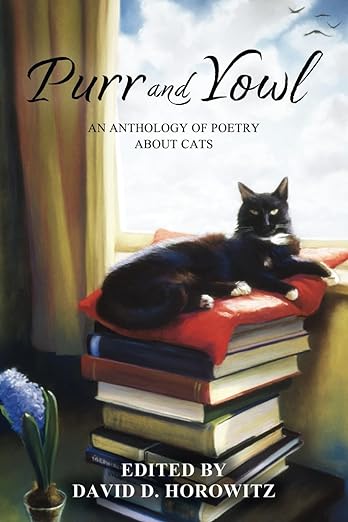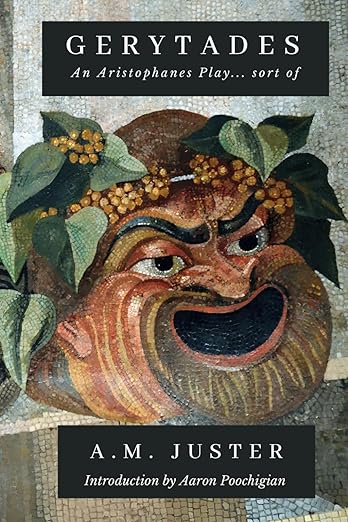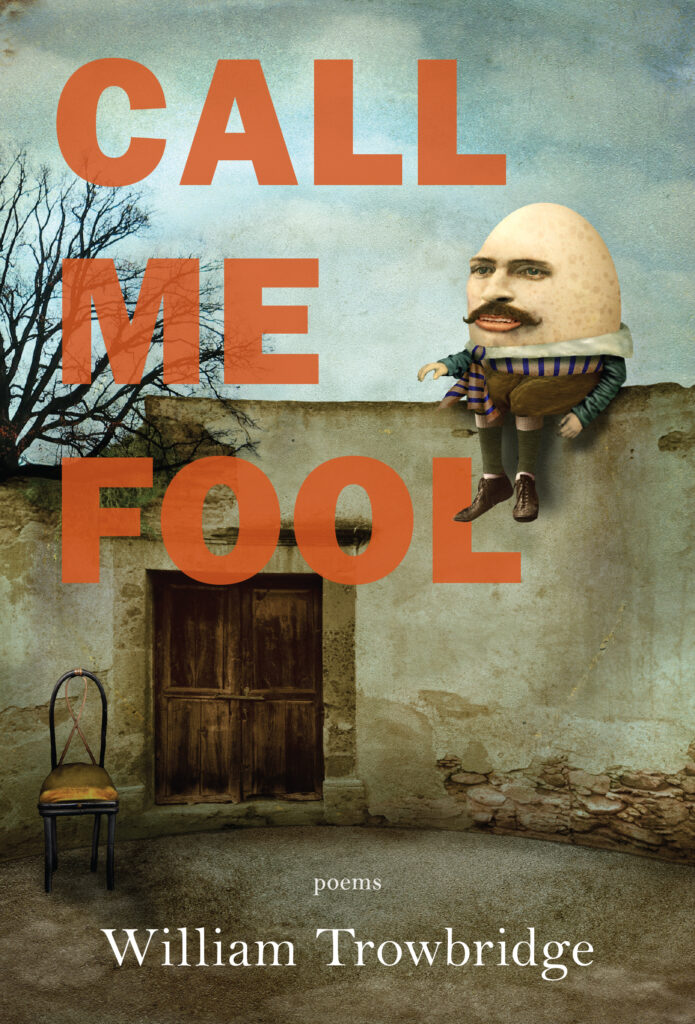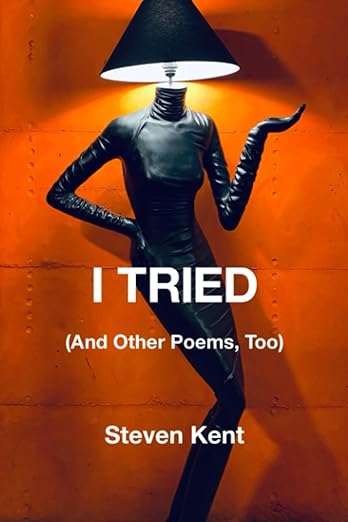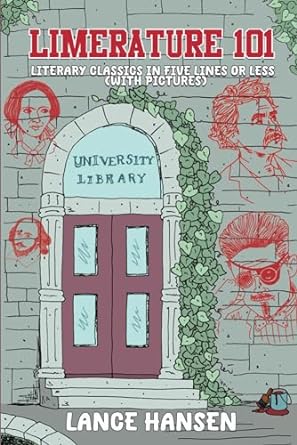If you have a book you’d like considered for a review in Light—one that includes a large helping of comic verse and was published within the previous 12 months, or will be published in the next eight—please send a copy to:
Barbara Loots
4741 Central St.
Ste. 601
Kansas City, MO 64112
(Pre-print-run electronic copies may be sent to lightpoetryreviews@gmail.com)
Light on Their Feet
Reviews of books written or edited by Lance Hansen, A.M. Juster, David D. Horowitz, Steven Kent, Penelope
Scambly Schott, and William Trowbridge
by Barbara Loots
Purr and Yowl: An Anthology of Poetry About Cats, edited by David D. Horowitz. World Enough Writers, 2023
Cat-loving readers at Light will know they’re in the right place when the lead-off poet in this new anthology is Master Poet and Cat Lady Gail White. Her nine poems at the top of the Table of Contents will get you purring. After that, nearly 100 poets, including several others well known to Light readers, reflect on the mystery and mischief of America’s favorite pet and domestic pest.
Richard Wakefield gives us the cat of “Contemplation” as she moves around from one spot of sun to another, “at last to curl once more/upon a cat-sized circle, settled in/as if her little weight upon the floor/could pin the sun, could stop the planet’s spin.” Stuart Stromin brings us a unique viewpoint in “Cats by Dogs” in which a canine observes, “Cats do not know how to bark/And are limited in hearing/But they see right through the dark/And are skilled at disappearing.” Michael Scholtes declares the superiority of felines by way of a limerick:
Puissant pussies pretending to purr,
Abyssinians licking their fur,
Grimalkins with mittens,
And alley-cat kittens
Surpass, as to class, any cur.
All forms of poetry are represented here, as poets variously describe their experience of feline relationship, from gripes—”My Cat is Crying (Again)”—to grief—”my friend tells me in a text”—to an imaginative recipe for a happy household titled “Gato Supreme.”
Some poems are scholarly, like Susan McLean’s elegant translations of cat poems by Rilke and Baudelaire—also, in a fun way, Joannie Strangeland’s “Jubilate Media Nocte” after Christopher Smart.
The standard of poetic craft throughout the collection is exemplary.
The book is handsomely produced, with a glossy cover photograph of a cat reclined—where else?—on a stack of books. Throughout the pages, small black-and-white illustrations reproduce paintings, drawings, photographs, and woodcuts with appealing charm.
Gerytades: An Aristophanes Play…sort of, by A. M. Juster. Contubernales Books, 2023
Are you sorry you somehow missed that course in Ancient Greek Playwrights once upon a time? Here to redeem your neglect is a modern American playwright, Justerides (aka A.M. Juster), who brings you a long-lost comedy for your edification, but mostly for your entertainment. Unfortunately, only tiny fragments of the original play have survived since 408 BC (these days BCE). Justerides picks up the slack and the story in a comic version worthy of the original (probably). In a spoof of today’s poetry scene, three heroes of historical (or hysterical) Greek poetry set out for the Underworld to bring back Orpheus and his lyric gifts.
The Prologue announces:
Words… that I… will choose…
will be… the simplest… that I… can use,
so all of you can understand this play—
a comic revelation in its day
that disappeared because barbarians
abandoned books and their librarians.
Sound familiar? Read on as the titular Gerytades sets out for Hades with three poets: Sannyrion for comedy, Meletus for tragedy, and Cinesius for dithyramb (you missed the course, remember?) plus a chorus of “critics.” Adventures along the way include a pit stop:
Their innkeeper has three gorgeous daughters
who love the body of each poet’s work—
or maybe bodies of just any jerk…
After an unsung gap in the narrative, we are told that “Hungover poets move like moody snails.” Nevertheless, the trek continues. The final mishap occurs at the verge of the River Styx, where
… Before they can be ferried,
they pass a field for souls who are unburied.
Some fell in war, some fell in wells too deep,
and some had spouses who were very cheap.”
What’s the outcome of this comical classical journey? I leave you to find out.
Call Me Fool, by William Trowbridge. Red Hen Press, 2022
William Trowbridge has stopped by the pages of Light before in the guise of Oldguy (Reviews, Summer/Fall 2020). Now he’s back with a collection recounting the exploits of a classic persona, The Fool, traced through world history from Creation to the Not Yet, in Trowbridge’s crafted and crafty style.
A quote from The Fool: His Social and Literary History, by Enid Welsford, sets the stage: “… It is all very well to laugh at the buffeted simpleton: we too are subject to the blows of fate, and of people stronger and wiser than ourselves, in fact we are the silly Clown, the helpless Fool….” With this introduction, the seriousness ends and the sendup of the human predicament begins:
Call Him Mr. Lucky
Fool recalls his demotion from archangel
to something called an archetype after he
was flimflammed by Lucifer and his buddies,
who seemed to have a viable way out of
a place where everyone’s locked in orbit
around The Almighty, who likes his hallelujahs
chorused non-stop, like on a cracked LP.
But making Hell a heaven didn’t fly,
and now he’s on earth, buying Florida
swampland, phony Rolexes, and weekend
ski trips to Uganda…
Subsequent irreverent accounts describe the Fool’s presence in Bible stories, European history, miscellaneous legends, literature, and culture. The poems reveal the well-furnished mind and often slapstick spirit Trowbridge brings to the project. Sample titles: “Robin Fool and His Disconsolate Men;” “In 1823, after Inventing a Flush Toilet, Fool Discovers Penicillin, X-Rays, Plastic, and Super Glue;” and one of my favorites:
Laureate Fool
After trying to write a couple of poems,
Fool decides to submit them to a trendy
literary magazine, failing to notice he’s
mixed them up with his grocery list …
… Almost at once, he gets
an acceptance letter praising the depth
of his “edgy ellipticity” and saying he’s
been awarded the Breakthrough Prize …
It’s hard to snip out bits from these finely crafted poems. They look so serious on the page, laid out in tidy couplets and triplets and quatrains. In this semblance of form, Trowbridge never wastes a word or a line. His nonsense is calculated and clever. He convinces me that rhyme and meter, which I’ve always considered to be the essence of humorous verse, are not actual requirements.
I Tried (And Other Poems, Too), by Stephen Kent. Kelsay Books, 2023
A frequent contributor to Light, Stephen Kent won a coveted 2023 Pushcart Prize nomination from our favorite literary magazine. In his new collection, you’ll find a large helping of the good stuff he’s written and published here and elsewhere gathered in one place.
By “the good stuff” I mean, for one thing, excellent verse craft. For example, last lines that “click.” Sometimes you might see it coming just a bit, as in “Can’t Get Better,” the opening love poem (what a good starting place). But along the way, you’ll encounter impeccable meter, exact rhymes, and references to greats like Shakespeare and da Vinci. So I’m not giving away that “click” of a punch line.
I like the march of couplets in “Reunion,” a poem that some of us way past so-called retirement age might find ruefully amusing, if way too true.
Speaking of retirement, Kent shows off his craft skills with a triple meter in “Much More Nothing.” It begins
Some tell me they’re bored in retirement:
One day’s like another, they state,
With nothing by way of appointments
And nothing of note on their plate.
In my old days as a greeting card writer, triple meters created a conversational tone, and it’s a fine choice for humor, too. Kent uses it effectively in “Unacknowledged,” which begins
The poets have been losing in the legislative game;
We’re unacknowledged still, now more than ever….
Another important skill in light verse is, of course, economy. We Hallmark writers were often warned against “padding” for meter or rhyme. In his many variations of rhyme and meter, Kent avoids stray syllables. But he isn’t above inventing words. Here’s his advice for would-be Light contributors:
You long to create lots of laughter?
Of mirth you’d be much more a crafter?
Forget all the gimmericks
Go forth and write limericks
(But do keep your day job hereafter.)
Organized by theme, the collection includes a section of Headline Poems, some previously seen in Light‘s Poems of the Week. It’s good to see them preserved in print. Other poems have appeared in regular issues of Light. One of my favorites is “Losing My Religion(s)” which makes the most of the limerick form in six stanzas. Just for openers…
I make a bad Buddhist, I know.
I aim to be better but still
Despite all my trying
Mosquitoes come flying,
And I go right in for the kill.
Space precludes quotes from longer poems I admired. There are many. But don’t take my word for it. Any poet who’s ever begged a blurb will appreciate the source and content of Kent’s back cover endorsements, including this one: This is a very recent book.—Hugh Moore Reiter
Limerature 1O1: Literary Classics in Five Lines or Less (with Pictures), by Lance Hansen. Humorist Books, 2023
Hey, you with your degrees in LIT—you never got around to reading it all, did you? Now Lance Hansen brings all of us up to speed. His “syllabus” begins with the Ancients (Gilgamesh, etc.) and proceeds through the Modernists. It’s a quirky selection. But the instructor is modest about it:
A desperate writer named Lance
Sought to pare novels down to a glance
The unmoved literati
Took one look at his body
Of work and declared, “Not a chance.”
Each work, pared down to a limerick, is accompanied by a pencil sketch of the writer. Tennessee Williams, cigarette in hand, appears to look askance at the following synopsis:
A Streetcar Named Desire
New transplant to the French Quarter,
Blanche DuBois is an uneasy boarder
Of her kid sister Stella,
Whose gruff, brutish fellah
Takes advantage of Blanche’s disorder.
Did you ever read that play? Me neither. But I did see the movie of this one by Edward Albee:
Who’s Afraid of Virginia Woolf?
A couple-unhappily spoused
And some newlyweds, get themselves soused.
Seems these two drunken louts
Have belligerent bouts
Since their hope for a child has been doused.
Current politics invite us to revisit prophets like George Orwell. Here’s a synopsis:
Nineteen Eighty-Four
As one of the State’s bureaucrats
Winston Smith’s job was doctoring stats
Then he sold out his lover,
Pledged his heart to Big Brother
To avoid being eaten by rats.
You get the idea. The punctuation is casual. The sketches are charming. Altogether you’ll find entertainment, a ready reference to “literary classics,” and inspiration for your next foray into the limerick.
gOD: A Respectfully Divergent Testament, by Penelope Scambly Schott. The Poetry Box, 2024
A sense of humor may be the primary requirement for preserving faith—or let’s call it trust—in the universe as it’s unfolding now. Helpfully, Penelope Scambly Schott brings us the word(s) of gOD in 39 crafted short poems on subjects from self-description to creation; from the salamander to the Ten Suggestions; on war and peace and proof. And more.
Commenting on All the Religions, gOD says:
Methodist, Buddhist, everyone an -ist with an -ism.
Doesn’t that seem redundant? So many stories:
Moses on the Mountain, Gautama under his tree,
or standing on a turtle on a turtle all the way down
to arrive at the same conclusion: Do unto others.
But I came first. My secret name is Story. No more
to explain. Next page, a new approach.
Every next page in this collection brings a fresh affirmation that life on this planet was meant to be good, including you and yours. Yes, we must consider When gOD Gets Tired. However, we’re invited to think about Sizes:
The universe: so indescribably huge and still expanding.
Or a single atomic particle: tiny and always in motion.
A baby porcupine: one pound. A porcupette. No joke.
A thought: so minuscule it vanishes, or maybe bigger
than the universe. For example, imagine two universes.
There, you’ve done it. That’s sort of how gOD operates—
my mind creating possibilities that make themselves true
Do you want a super-size avalanche? A wider waterfall?
Hey, just remember I grew you from a tiny baby.
Light poets may also like to know about The Poetry Box, “a boutique publishing company in Portland, Oregon.”
Reviewer’s Note:
Only the best poets on the planet can pull off great light verse. So say I. Now, thanks to my appointment by the editors of Light as their reviewer, I feel privileged to share my enthusiasm for the latest books featuring a helping of funny.
As to credentials, my list of publications is respectable for someone who’s never given up writing in traditional forms. For details, you can Google me or see barbaraloots.com. A long career as a writer for Hallmark (of greeting cards and many other things) honed my craft and sharpened my distinctions between one kind of poetry and another. The humorous kind requires skills they don’t teach in MFA programs. (Snort.)
I believe that the chief qualification of a reviewer is humility. I look forward to being a faithful reader, happy to tell you what I think, hoping you’ll like it.
Yours truly,
Barb Loots (rhymes with goats)

